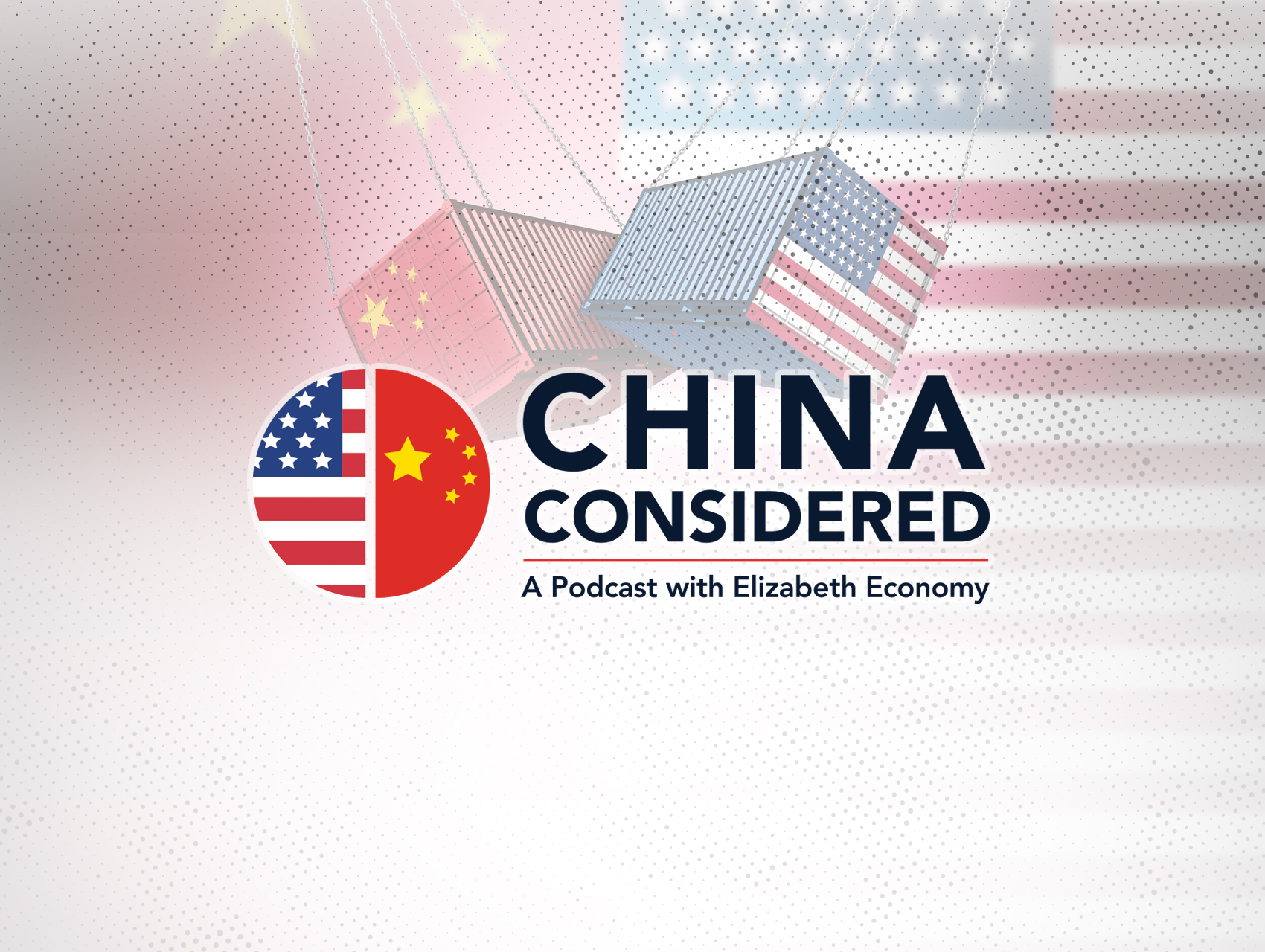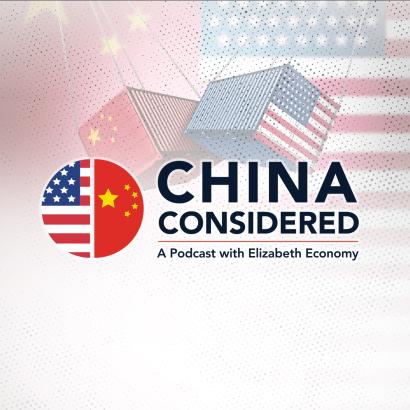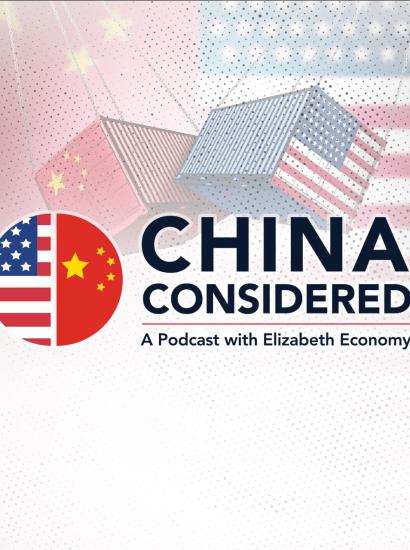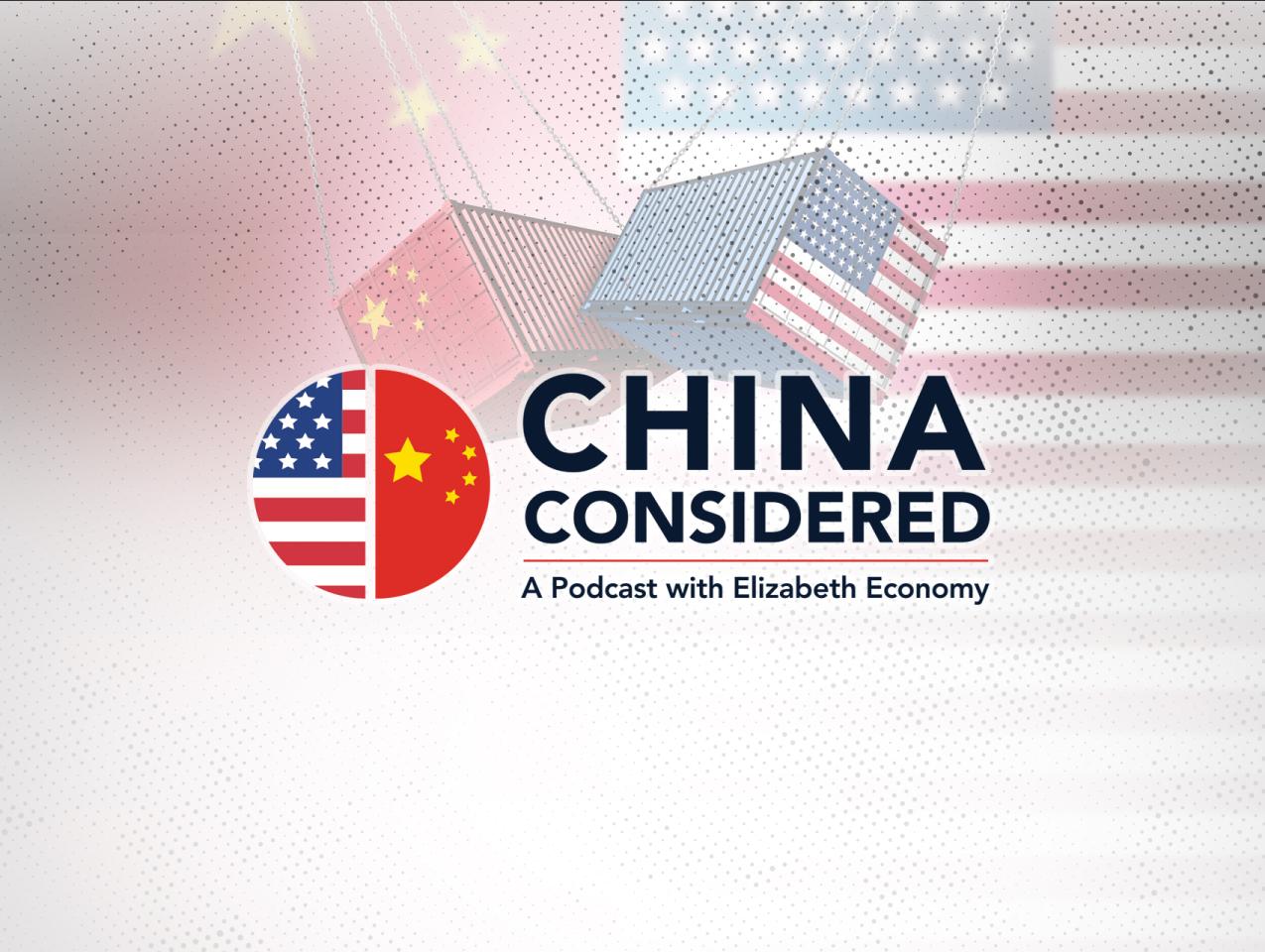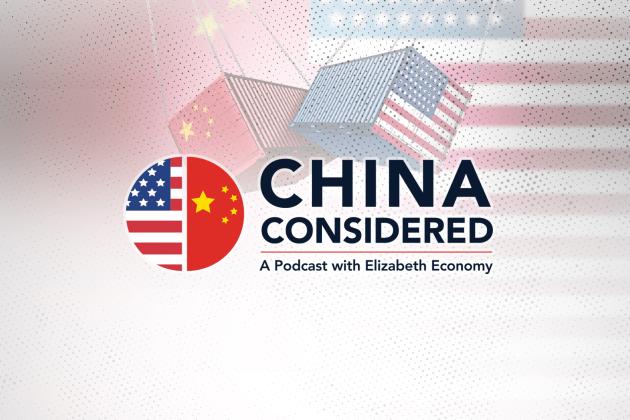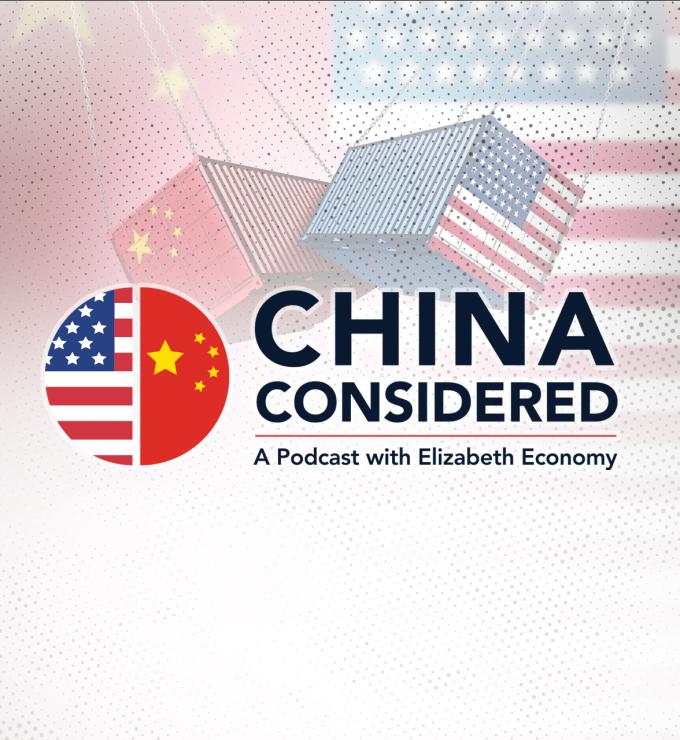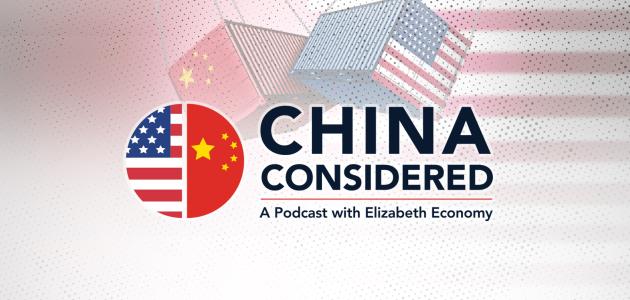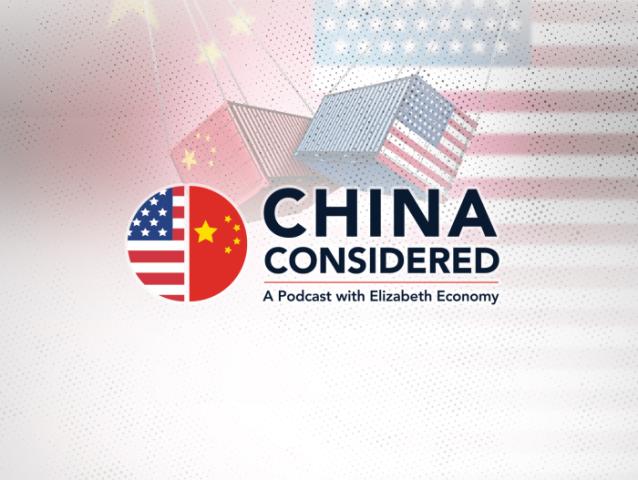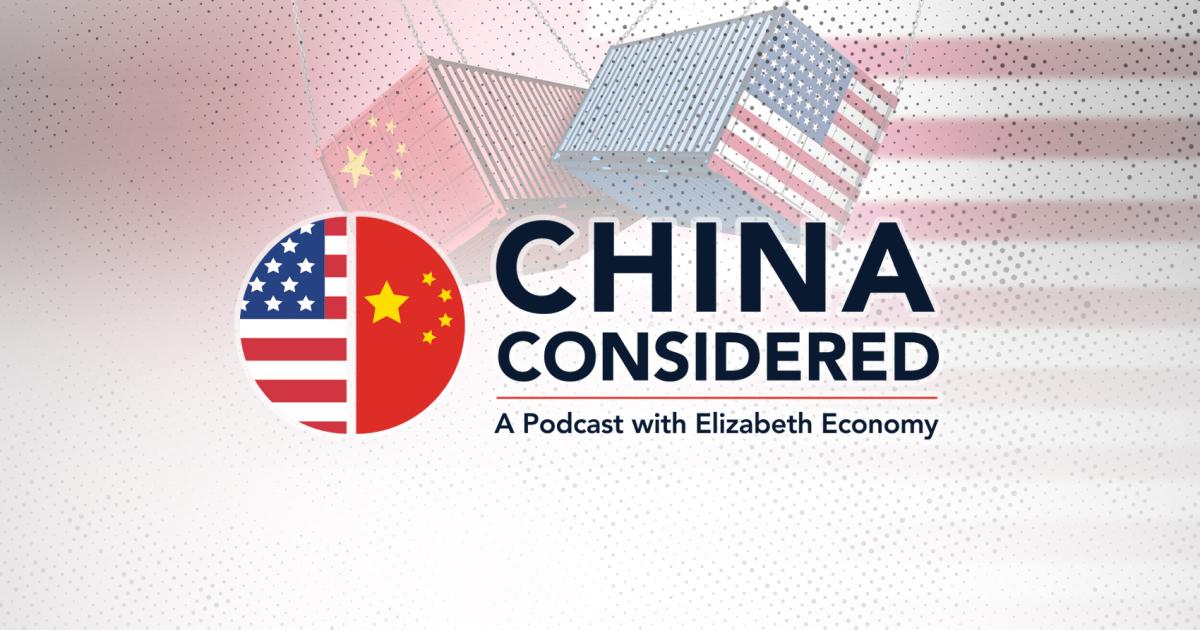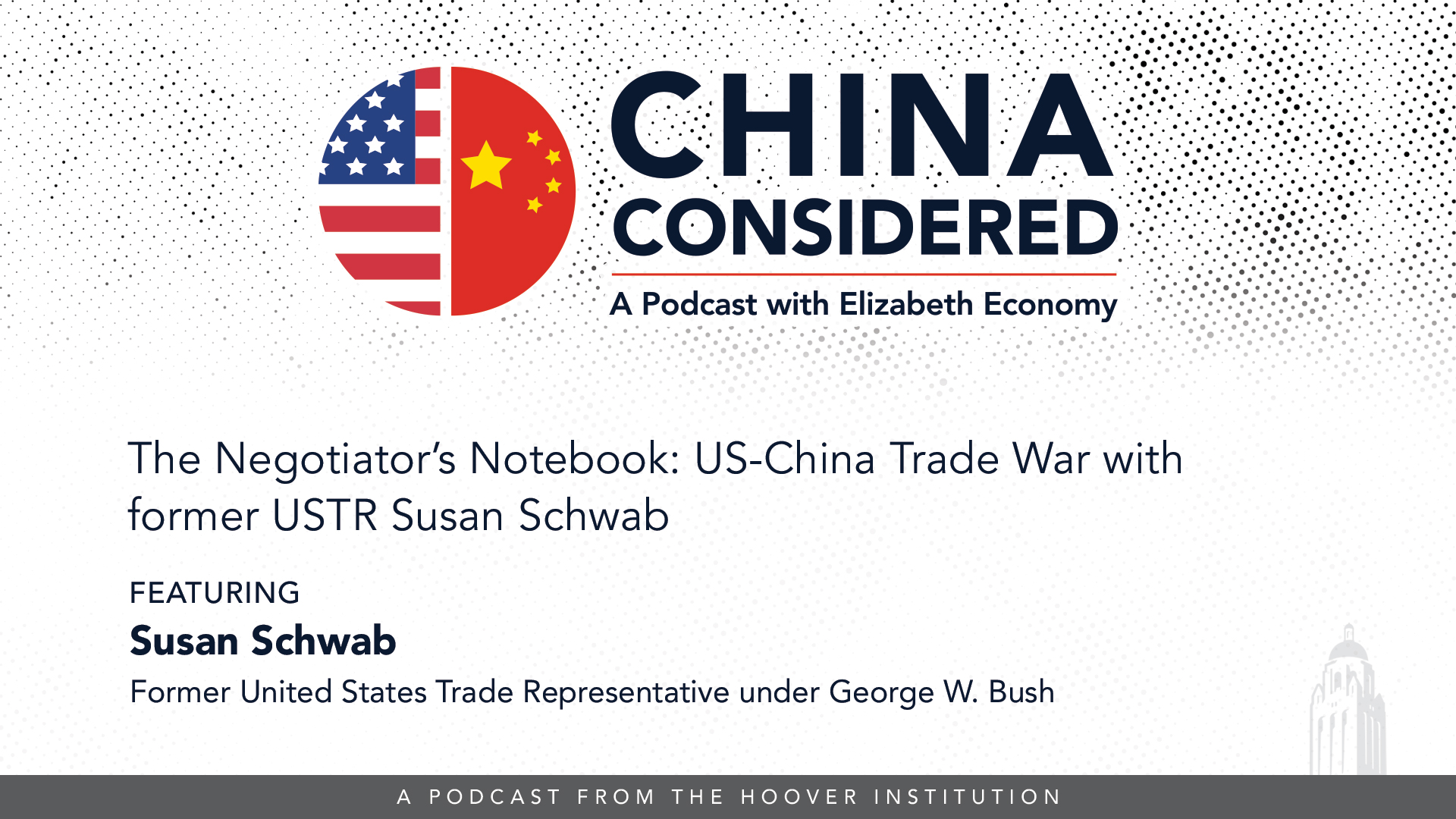- China
- Trade
- Confronting and Competing with China
Dr. Elizabeth Economy and Susan Schwab sit down to discuss the current global trade environment and the outlook for US-China trade relations in the aftermath of negotiations in Geneva. The two discuss the magnitude and reaction to President Trump’s “Liberation Day” tariffs, along with the motivations and scale behind the actions. Schwab then explains the dynamics of negotiating within a presidential administration and the importance of understanding the objectives and red lines within those negotiations. The two conclude with an assessment of the US-China trade war, recent developments in the relationship, and what the United States can best do to compete with China in a new era. Economy and Schwab touch on the importance of engaging allies, clearly illustrating the rules China is violating and using a whole-of-government approach to take on the challenge.
Recorded on May 13, 2025.
WATCH THE EPISODE
>> Elizabeth Economy: Foreign welcome to China Considered, a podcast that brings fresh insights and informed discussion to one of the most consequential issues of our time, how China's changing and changing the world. I'm Liz Economy Hargrove, senior Fellow and co Director of the Program on US China and the World at the Hoover Institution at Stanford University.
Today, we're going to talk about tariffs, a word that President Trump has said is one of the most beautiful ones in the dictionary. And we're really, we're really lucky to have Ambassador Susan Schwab, who was the US Trade Representative during the term of President George W. Bush and currently a strategic advisor to the law firm Mayor Brown, to help us understand everything we need to know about this sometimes complicated, complex topic.
Susan, I know you are in much demand these days. Your interviews are blanketing the airwaves. So thank you so much for taking the time to speak with us.
>> Susan Schwab: Well, thank you, Liz, you know I'm a fan.
>> Elizabeth Economy: So let's get to it. On April 2, President Trump announced Liberation Day.
His administration placed 10% tariffs on all goods coming into the United States and then additional tariffs at varying rates on goods coming from dozens of countries. Then within a week, he started to give countries a reprieve. Let's start with why he did this. What is his strategy?
>> Susan Schwab: So the first, as you said, April 2nd, Liberation Day, I think everyone was caught by surprise about the magnitude.
So the reciprocal tariffs, sort of with a 10% baseline and then above that up to above 30, 40% depending on the country, they're called reciprocal tariffs. They aren't actually reciprocal tariffs. They are based on a formula that has to do with the size of the US Trade deficit with that country.
And in countries where the US Has a trade surplus, and there are a few of them, they get just flat out 10%. So that was how it was constructed. It was a shock to everyone. Trading partners, and one has the sense watching the Rose Garden ceremonies are shocked to a lot of people in the Trump administration, certainly the business community and the markets reacted very badly, very badly.
Stock market, bonds, the whole bit. And the president and his team discovered that, yes, in fact, there was a tipping point beyond which you can't go on tariffs which without significant disruption in the economy or risking a significant disruption in the economy. And so April 8 came the announcement that these tariffs were going to be suspended for every country except China.
For. A 90 day period during which time bilateral negotiations were going to take place to address the challenges, the motivations, the objectives, the priorities that this administration has China, let's separate China for right now. So that list of countries, I mean that, that list of countries is very significant.
It's over 60. The, the motivations, it's sort of interesting. It depends on who you're talking to on what day. Let's start with the president's assertion that everyone has. This is a PG13. Everyone has been unfair to the United States in terms of its treatment of our exports, treatment of our trade.
They have treated us unfairly since forever and we need to get back at them. Motivation 1, 2 Motivation Reindustrialization, rebuilding an industrial base in the United States. The assertion that we don't make anything here anymore, which by the way, is not accurate, but we don't make anything anymore.
Trying to use tariffs to increase investment in manufacturing in the United States and manufacturing employment in the United States. Changing behavior of trading partners in terms of their foreign barriers, the objective of raising revenues to help plug the rather significant gap in our federal budget. A variety of other objectives, some of which now show up in the template that the administration appears to be presenting to each of the trading partners.
But that gets into both the issues that I addressed and some other issues having to do with how they, in some cases, how they treat China, how they treat US Exports, specific barriers that show up in the National Trade Estimate Report that the USTR puts out once a year.
So you, you sort of take those major motivations and translate them into specific asks of specific trading partners.
>> Elizabeth Economy: So you were. So a whole range of issues, a whole range of ostensible motivations, and maybe some of them coming different parts of the administration. And we can come back to sort of the views within the administration because they're not uniform, which makes.
>> Susan Schwab: And they're not necessarily mutually consistent.
>> Elizabeth Economy: Right, that's all, Right. It's another problem. We'll come back to that in a minute. But you were ustr, is this, is President Trump really the first president to use tariffs in this way or have other presidents, you know, how did, how did George W.
Bush use tariffs? What was the point during his tenure? How did he think about them?
>> Susan Schwab: Well, I think it's safe to say that President Trump is the first president since, let's say, 1934, because one would argue, I would argue that US trade policy, contemporary US trade policy, really started after 1930, after the Smoot Hawley Tariff act of 1930, and really started with the Reciprocal Trade act of 1934.
And since then, presidents have used tariffs both in terms of carrots and sticks, but more carrots than sticks. Right, reciprocal trade negotiations, negotiation of bilateral trade agreements, of multilateral, of sectoral trade agreements using tariffs as allure. We'll lower our tariffs in areas where, where you're competitive if you lower tariffs and non tariff barriers obviously in areas where we're competitive.
So that kind of negotiation and then Obviously starting in 1947, the General Agreement on Tariffs and Trade and you bring in the concept of most favored nation treatment and non discrimination and so on. Now the use of tariffs as a negative motivator, the first major use of that I would argue is the first Trump administration.
The Biden administration, as you know, didn't lower those tariffs, Right? And from time to time, yes, the United States has raised tariffs to force, persuade, encourage a change in behavior by other trading partners, particularly as it impacts U.S. exports, and that is generally through Section 301 of the Trade act of 1974.
After an investigation as to whether there are. Are acts, policies and practices that are unreasonable, burdensome and a whole variety of other terms. But yeah, tariffs have been used that way, but they're sort of scalp alike rather than across the board and based on calculation, based on deficits, rather than based on the value of trade impacted, say by that trade barrier or by that unfair trade practice, which is we put up tariffs all the time related to dumped product, product that subsidized into this market and injuring US Producers.
I mean, we use tariffs, but not quite the way they're being used under this administration.
>> Elizabeth Economy: Arguably the Trump administration put these tariffs on as a form of leverage, given how quickly, right. Within the space of a week, as you mentioned, all of a sudden you're getting a reprieve, a 90 day reprieve.
So this seems more like here's the threat of action. Of course it causes an enormous amount of tumult, as you also pointed out. And then we're giving you 90 days and we're going to negotiate with really no expectation. I don't believe that the tariffs are going to remain at the high level that they were for many countries.
Is that fair that in essence these were just a threat and then, you know, the real negotiation begins and nobody expects that they're going to stay.
>> Susan Schwab: It is a great question. I mean, the real question is what happens July 9, right. That's 90 days after the challenge.
And this is speaking as a former negotiator, the challenge is they shot the hostage, right. And once you've shot the hostage, that kind of changes the negotiating dynamic. Now, you could argue they showed that they are capable of shooting the hostage, but they backed down. And they backed down for good reasons, by the way.
I'm not arguing with that, but it does change the negotiating dynamics somewhat. And so that, and the fact that they're never going to be able to negotiate with all of those countries and do deals with all those countries before July 9th. So there's a question, and let's face it, the uncertainty that all of this creates, whether you're talking about domestic US Firms that are thinking about investing or foreign companies that are thinking about investing or companies that are making purchase decisions, all that's kind of up in the air because nobody knows what the tariff is going to be, Right.
No one knows what they're going to be paying. And in some cases you're talking about tariffs that are, you know, twice the cost of the product in the first place or more.
>> Elizabeth Economy: Right. And then for some, in some cases, I know for countries like Madagascar, right, where they have A surplus of cloves and vanilla, right?
One of this countries on Earth. You're wondering, what is the point of this really.
>> Susan Schwab: PG water or Lesotho? I mean, little, small, poor countries that. Small, poor countries that, you know, are trying to make it in a tough trading world. And, and, you know, we might have given them trade preferences.
Trade preferences 10 years ago. And, and now the administration slaps a tariff on them and they don't know what hit them. And, by the way, the administration doesn't. Isn't going to have time to negotiate with them anytime soon. So they're facing the prospect of real chaos unless, you know, the pause is extended for them.
It's not their fault they're not getting an audience with ustr.
>> Elizabeth Economy: Right. And I guess that begs the question as well. I mean, you know, it does seem as though there are just some differences of opinion within this administration. Not everybody seems to be aligned. I think, Kevin Hassett, for example, has written for years about tariffs, not in a, not particularly favorably.
So how do you sort of understand the dynamics of the administration? And do you think that has contributed to some of the chaos that we seem to have experienced in this process?
>> Susan Schwab: Well, you know, each, each president runs their operation, runs their cabinet the way they choose to run it.
I was very, you know, I was blessed by working for George W. Bush, who was a terrific boss, and you could tell he had been a CEO. You knew your red line. I felt very empowered as a negotiator. I knew my red lines. I would sit down with my, say, Chinese counterparts who had to phone home for every single decision that they had to make.
Whereas we sat at the table and we could wheel and deal because we knew we could be innovative and creative in the structures we came up with. And we knew what the red lines were, we knew what our objectives were, we were empowered. And our marching orders generally were, get the best deal you can, and if it's a bad deal, you walk away.
And I did both as ustr. I got some good deals and I walked away from bad deals. So the current team, there was only one decider, right. And that is the president, and he is delegating up to a point, but no further. And I think I have the sense that they're settling into a rhythm and they're settling into who has what responsibility, right?
So you have Secretary Besant and Jameson Greer as the lead in the China talks at this point. You have Secretary Lutnick and Ambassador Greer on all the other negotiations. I think it's pretty safe to say that most of the work is being done at USTR and the interagency process, you know, experts at the Commerce Department, experts at the Agriculture Department, experts at the Treasury Department, and that's the way that interagency process has always worked.
What they don't know is, and nobody knows at the end of the day, what is going to be satisfactory and what else the president's going to want.
>> Elizabeth Economy: Right. And so we've seen the deal with the UK and now a big investment deal with Saudi Arabia, investment and trade deal with Saudi Arabia.
How do you evaluate these deals? I mean, the president, of course, has called them successes, big successes. I mean, as a US Trade negotiator, do you see these as successes from where we started to what we got? Do they seem like successes to you?
>> Susan Schwab: Well, if you're talking about I'm not familiar at all with the Saudi deal at this point, except that obviously the United States has always been or certainly has been in the, you know, the contemporary decades, a really good place to invest.
And that has been evident by the amount of foreign direct investment, both in terms of stock and flows. And the key is not to screw that up. And I think the president wants to be a part of encouraging that or forcing that. And he declares victory. When he has done that, we'll see what how the, you know, press releases translate into action, actual investment.
Some of that investment is gonna come in slowly. We know that it takes a long time to build, you know, factories or retool factories. It takes a long time to hire people, particularly when you've got skill deficits in the United States. But those are to be applauded if they come through in terms of some of the other.
The other elements, there's the fact that they are negotiating agreements. I mean, I give them credit in terms of the UK deal. There is some substance there, there's a whole lot of work to be done. And I give both sides credit in terms of the UK deal for having got as far as they did.
But the devil is always in the details and they're going to have to work those out and we'll see. You know, the, the, the last we've heard is that, is that, you know, Switzerland is, is up on the list. The EU is not so far up on the list.
They are negotiating. I don't know what the latest count is, but, but with at least 20 countries where negotiating is, seems to be defined as the country has to not have retaliated, has to come in with a proposal. Then the US hands them the template with the specific asks and that may be remove these barriers again from the National Trade Estimate Report.
Perhaps some purchases, purchase agreements, perhaps encouraging foreign direct investment actions to reduce the trade deficit. But that's hard to do, I mean, because governments can't, you know, commit to that. But if there are concerns about currency manipulation, commitments on currency manipulation, and in some cases it, it's quite clear concerns or, or actions to address concerns about Chinese overcapacity finding its way into third country markets and then coming to the US and those are going to be harder for some countries than others.
But that seems to be one of the kinds of things that shows up or is being asked in these agreements. There are also some really interesting things on the digital front, some to be getting, some of which they, they aren't necessarily getting. That that was still a standoff in the UK case digital services tax, which we have a real problem with.
But they've agreed to have a digital technology forum bylat and if they can come up with a deal there, that'd be terrific too.
>> Elizabeth Economy: Yeah, I, I think that was one of the points that they said we're going to move forward right on trying to come up with some kind of digital trade agreement which would be, I think, terrific.
That would represent a real step forward. And as for the Saudi deal, I would just say it's a lot of investment. The trade seems to be mostly in purchases of defense equipment, military equipment by the Saudis, but a lot of Saudi investment here and some investment by our tech companies there and you know, worth apparently $600 billion.
Although again, to your point about what actually materializes, there's some that, you know, could take a long time and there's also some that's already underway that they've just kind of included, as we both know from working on these kinds of statements in the US Government, you try to take advantage of things that may also already be in the works.
And it's clear there's some of that wrapped up in this as well.
>> Susan Schwab: And the thing to remember about the UK Deal is the first Trump administration worked very hard on a bilateral trade agreement, I mean, like a full scale comprehensive trade agreement with the UK So they put in several years on that and they had that available to them as a template, a blueprint that they could draw on for this current negotiation and people on both sides who had been involved in those negotiations, namely Jameson Greer and Amanda Brooks on the UK side, among others.
>> Elizabeth Economy: And they're back again, right?
>> Susan Schwab: That's exactly right.
>> Elizabeth Economy: Yeah. So they have the opportunity now to move things forward. So that is, I think, a very, you know, a positive sign. So let's spend a minute on China. You know, as you mentioned, USTR Greer, Ambassador Greer and Treasury Secretary Besant, they were in Switzerland with their Chinese counterparts.
They came to some accord. They, you know, huge reduction in the tariff levels on both sides. So that now for the next 90 days, it's sort of 30%, I think, in terms of Chinese goods coming into the US and 10% on US goods going into China. And the Chinese removed all of the non tariff measures that they'd put, I think critically for us on the critical minerals, rare earth elements.
But the narrative seems to be-
>> Susan Schwab: Let me offer just one caveat.
>> Elizabeth Economy: Sure, absolutely.
>> Susan Schwab: It is, if you look at the press releases, it is the US and China dropping the tariffs that they imposed on April 2nd by 115%.
>> Elizabeth Economy: Right.
>> Susan Schwab: So it's not a 30% tariff.
It is on the US side, 30%. 10 plus the 20, the 10% baseline, the 20% fentanyl on the Chinese side, 10% on top of what was in effect on April 1st.
>> Elizabeth Economy: Thank you for that.
>> Susan Schwab: Yeah. So,
>> Elizabeth Economy: okay,
>> Susan Schwab: so we're talking about tariffs that can go well in excess of 30%.
>> Elizabeth Economy: Okay.
>> Susan Schwab: And then there were some changes in de minimis that had again, we went from prohibitive, you know, they, as they refer to it as effectively an embargo.
>> Elizabeth Economy: Right.
>> Susan Schwab: To high but not prohibitive depending on the product.
>> Elizabeth Economy: Right.
>> Susan Schwab: Depending on the product, depending on the sector, there will be some resumption of some resumption of trade.
>> Elizabeth Economy: So that's a very important distinction, thank you for that. So people are saying, or the media, I would say the general narrative has been that Somehow China won that Xi Jinping, standing tough, standing firm, that actually China came out ahead. Is that how you read this?
>> Susan Schwab: Not really.
I sort of read it as both of them finally came to their senses and sent some adults to Geneva to talk.
>> Elizabeth Economy: Yeah.
>> Susan Schwab: We were an absurd situation where the fact that neither one wanted to make the first call at the leader level was just utterly absurd, while both economies were feeling significantly negative impacts, for God's sake, just sit down and talk.
And they finally sent some adults to do that.
>> Elizabeth Economy: Right. Yeah. My sense was that both leaders recognized that the real hurt was about to hit and take action. Now, serious problem, yeah.
>> Susan Schwab: You're aware, more than, more than most, the extent to which so much of China, so many of China's exports to the US Are actually small, medium sized,
>> Elizabeth Economy: Right.
>> Susan Schwab: Enterprises that can't last that long. And there's a limit to how long people are gonna be able to hang out not producing things and not getting money and having contracts canceled. Because these tariffs are across the board, not just on. And are across the board, not just on critical items.
>> Elizabeth Economy: Right. And I think the Trump administration, for its pardon, to its credit, recognized that, you know, no matter that the President says, you know, you can have two dolls instead of $30. Dolls this was going to affect a lot more than that in terms of consumer prices for American families and that this was going to have significant negative impact on the U.S economy.
And we're already seeing in terms of the shipping and containers and just the whole supply chain really, I think was under threat. So many different parts of the US Economy would be hit, not even just the US Consumer. So I think, you know, for both sides coming together, I think it was a, you know, it was time.
So, you know, what about the, if we're focusing on China, you know, what about the longer term benefits of what the president is trying to do or the longer term costs? I mean, if you were sitting, you know, with him or sitting with Jamison at this point, what would you recommend moving forward now?
What would you say? This is really how I would try to structure a deal or here's where I think there's room to actually get something useful from the Chinese. What do you see as the opportunity at this point? What do you see as the risk?
>> Susan Schwab: So I guess I would say the Chinese have been decoupling for over a decade and we need to be more strategic about what we're doing.
You can call it decoupling in strategic areas, you can call it de risking as the Europeans are. But the fact of the matter is the Chinese have been doing it and we have not. There were some effort is, you know, some effort in, under your tutelage under, under Secretary Raimondo and on a couple, in a couple of sectors, but not generally on the trade side.
And it was interesting to hear Jameson Greer comment that there were no bilateral conversations going on between USTR and their Chinese counterparts over the last several years. So not,
>> Elizabeth Economy: I have to say, at the Commerce Department we had discussions going on on the US China business relationship and treasury had those discussions, but quite right that USTR really hadn't, really hadn't established any sort of channel of communication with their counterparts.
>> Susan Schwab: Right. And you need a whole of government approach and you really need, I mean if you're going to do it right, you're going to need a whole of government approach. And so that's, you know, a second piece of advice which is you got to figure out what your priorities are and that's what you target.
And dolls, I'm not sure dolls is it apparel, footwear, you got to figure out what, what is it that we can be trading with each other and that's going to be in the tens and hundreds of billions of dollars that I was going to say nobody cares about, but a lot of people care about, they're good for both sides.
Whereas those aspects of the trading relationship that by one definition or another are sensitive in terms of security, whether on the import side or the export side. And those are the ones we need to be focused on. So that would be really my first piece of advice is figure out what matters and what doesn't matter and just focus on that.
The second piece of advice, so the first piece of advice might actually be taken seriously. The second piece of advice is we really need our allies on board on this.
>> Elizabeth Economy: Yeah.
>> Susan Schwab: And you know, you can't, I'm not going to pretend you can dial back the clock, but I would hope in the context of negotiations with other trading partners as we try to address the existing tariffs or you know, the situation we find ourselves in or they find themselves in with the, the, the bilaterals that will be going forward, that a premium is placed on how to address the China relationship both in terms of, of how we and our trading partners behave, but also how to reinforce the trading system, the wto, the GATT rules, to make sure that it's not just the US alone or not just the US and Japan or the EU alone, but that there are a whole lot of countries out there that are really unhappy with China and China's trading practices.
Whether it's the coercive side, whether it's the fact that all they're doing is shipping raw materials to China. Yeah, China is their biggest trading partner. But, but it's because China is a market for their raw materials.
>> Elizabeth Economy: Right.
>> Susan Schwab: And they would rather be adding value and adding more skilled, you know, skilled labor on their side.
So they don't want to be China's plantation. And I think there's room for reinforcing rules that are agreed and enforced multilaterally and plural, laterally, you know, multi country agreements, agreements among the willing. I would take us back to cptpp. That's not gonna happen. But something like that, where we have countries that had the same concerns that we do, cooperating doesn't have to be a formal agreement, but I would put that higher on the list, I think, than some of the terrorists per se.
And then third, the sooner you can get certainty into the markets, the better because then the sooner businesses can do the kind of investing that the administration would like. And finally, visas, you know, work visas, typically skilled, you know, H1B visas, skilled labor visas, and that includes visas for people in trades where we have not and have not been able to and can't find the, the bodies to, to do the welding or other trade.
So not displacing US Workers but finding workers to take on those jobs in those factories where we've run out of US Workers. So those would be, those would be my recommendations.
>> Elizabeth Economy: So let me, let me pick up on a couple of points. I think on the sort of more proactive trade policy which has been I think lacking over the past eight years has even just, it's not even something new.
I think we can agree. Do you see that happening, a reform, a wholesale reform of the wto? Do you see a way in which China is involved in a new or if not, do you see a way that China is involved in any sort of new trading regime?
Or do you really think realistically that we can only have trade agreements now among like minded democratic partners or you know, countries that are at least operating with the same level of, you know, labor standards and corporate governance and you know, market openness? I mean, how is there a way that, that China actually is in a global trading regime and we're in it at the same time?
>> Susan Schwab: So I think first of all that we've done a lousy job. We over as you say, a decade of taking China to the WTO and filing cases against China that are winnable cases. Everyone focuses on the dispute settlement, you know, the appellate body. And that's the wrong, that's, that's been a diversion.
As far as I'm concerned. The GATT Pretty well before the WTO and before there was an appellate body. And we need to be running up the, we need to be running up the, the score and showing that China is, in fact, violating a whole lot of things that China committed to do when they joined the wto.
I think we just need to be showing that over and over and over again because China keeps saying they're the good guys and they're the multilateralists, and, and they're, you know, they want partnerships and all that. And, and then, I'm sorry, that's not how they behave in real life.
So that would be the first thing. And I think WTO is very useful for that. And I think negotiating through the wto, you can smoke out the Chinese.
>> Elizabeth Economy: Okay, that's, I think, a really important point because I'm not sure that's the general sort of feeling in Washington these days.
I think, you know, the arguments. I was just, you know, in D.C. last week and at a meeting where there was a lot of trade discussion. And I would say that overall it was about, you know, sectoral trade agreements or, you know, a CPTPP type agreement, but a sort of throwing up the hands like, forget about the wto, I think, was really the general sense of the room.
>> Susan Schwab: I think there is value to be placed in plurilateral sectoral agreements. I think there is value in regional agreements or, you know, plurilateral agreements that are like CPTPP among willing countries, but I don't think they're mutually exclusive. You know, the, the WTO has, has particular benefits. And you can do.
There's certain things that you cannot do bilaterally and you cannot do with small agreements and you cannot necessarily do sectorally. So things like protecting intellectual property. And there are certain things that you can only do multilaterally that isn't going to bother anybody if you do them well. And having China and the US in the same agreement, the fisheries agreement, trade facilitation agreements, those are things that you really want to have multilaterally.
But it may be that if you're going to do a deal on, let's say, pharmaceuticals or medical equipment, and you want to make sure you got supply chains that are going to be there and operating and reliable sources of supply the next time you have a pandemic, it may be that you're not going to have China as part of that group, or maybe you are going to have China as part.
But you need to have the option. So I think you can do sectorals in parallel. You can do regional deals in parallel with the wto. But I wouldn't abandon the wto. We would have to reinvent it if it did.
>> Elizabeth Economy: I think that's a really important, important statement.
So maybe get, you need to get that out there a little, a little more. I don't think. Yeah, I just don't think that's the, that's the tenor of the conversation right now. But let me ask you one more question on the US China trade relationship, just the bilateral relationship, because it seems to me that you're, you know, you raised the point of, you know, where are we between de risking and decoupling.
We need to have a strategy for what it is that we want to do. I mean, a big part of what President Trump has said that he wants to get done is to sort of rebalance the, you know, $300 billion or more trade deficit that we now have with China.
Treasury Secretary Bessen has said that's going to take a couple of years. I mean, do you see that as even realistic, given the current state of what we export to China, what China exports to us? And in fact, if we are looking to strategically decouple, that could end up taking, you know, many more US you know, high tech products sort of off the table in terms of our exports to China.
So is that idea of rebalancing the trade deficit, do you think it's realistic at this point?
>> Susan Schwab: Yes and no. Yes, to the extent that the actions in the first Trump administration started that process and companies said, okay, the US doesn't want as much to import as much from China and therefore companies move manufacturing and moved sourcing to other countries, to Vietnam, to Malaysia, to Thailand.
And then the second Trump administration comes in and is focused on bilateral trade deficits from every country. And the companies that did what they thought they were being told to do in the first Trump administration are discovering they're facing all these big barriers, you know, these, these tariffs now.
So I think if you're really serious about addressing the US China trade challenge, you've got to be looking, you got to be taking seriously French shoring, you got to be taking seriously near shoring, which I would argue neither the first Trump administration nor the Biden administration really did.
And
>> Elizabeth Economy: we, I have to say, we did try. We built it into chips in science, actually. So there were some efforts at near and friend shoring, but go ahead.
>> Susan Schwab: Okay. And I think that has to be part of the strategy. And you're right, absolutely right. It takes an extended period of time.
We need to focus very heavily on Making sure that the US is the place where companies want to invest and where the R and D and the creativity and the innovation takes place organically. Right. That has to do with looking after university R D. It has to do with looking after Nest.
It has to do with looking after a lot of things that draw individuals from all over the world here to invest their time and effort and make money and create companies and create wealth for all Americans and quite frankly, others in the world as well. So I, I think you would have to differentiate between the China bilateral trade deficit and the rest of the world and where you would prioritize how those countries interact with China as opposed to the level of the bilateral trade deficit between those countries in the U.S.
>> Elizabeth Economy: right. So China becomes the strategic objective. Right. Dealing with China and that particular economic challenge, trade challenge becomes the primary objective and everything else you're arguing becomes in service of that to some extent.
>> Susan Schwab: Yeah. And the ideal, and I'm not saying that this is necessarily realistic, the ideal is that China starts getting nervous that this actually is going to work and that they are going to have to stimulate more domestic demand and, or play by the rules and they become a more responsible stakeholder.
>> Elizabeth Economy: Right, right. Which, you know, I think to your earlier point about the fact that there are many countries who are concerned about Chinese economic practices, including their export of their okra overcapacity, it's not simply the United States and Europe and Japan, but now it's a lot of middle income economies, India and Brazil and Argentina and Mexico as well, who don't want to see their nascent industries in areas like, you know, EVs and batteries and medical devices and every other made in China 2025 technology.
They don't want to see them, you know, sort of squashed before they are even given a chance to develop. So I think you're right. There's an opportunity, you know, if managed properly, to work with others and to hold. Hold China accountable and that these countries, in effect, when China sees their pushback, it's a very different dynamic, I think, frankly, from simply feeling as though it's the United States trying to contain us when they've got other partners, countries they generally consider to be their partners, saying these types of economic practices are not okay.
So maybe that is also another type of pressure that China is going to feel that could cause it to change some of its behaviors.
>> Susan Schwab: Yep, precisely.
>> Elizabeth Economy: So I always finish with a couple of just quick questions to get your thoughts. You've been looking at China for many, many years.
What is it that you think we don't know enough about China? When you're working on China, when you're thinking about it in the trade context or more broadly, what do you wish somehow that you knew more about?
>> Susan Schwab: I wish that I knew more about and the US Government knew more about or had a way to know more about the individuals, the Chinese individuals who really would rather be here, be educated here, be citizens here, who are not and would never be a national security threat.
Similarly, the capital flight and the technology flight generated by, you know, those individuals and those companies that do not pose a national security risk. And in our zealousness, and I don't know if that's a word in our, you know, well founded concern about national security, I think we are losing a major bet in terms of Chinese citizens and Chinese companies, private companies that would much rather be here than there.
And the Chinese are not missing that bet because they are doing everything they can to keep those companies and those individuals from exiting. And that should tell us something. And I wish I knew more about how one could differentiate. So that's,
>> Elizabeth Economy: I'll give a small plug to a project here at Hoover, actually, that's being run by one of my colleagues, Glenn Tifford, on research security, where they are looking at the sort of university and types of research that many scholars are doing in the scientific fields in China and tracking them to see, you know, which ones are not actually tied to military institutes or, you know, or security or the security apparatus so that you can have a degree of comfort with, you know, the majority of Chinese scientists who would like to partner or would like to work here.
And I think this again speaks to the earlier point you made that we need a sort of a holistic ecosystem if we're going to be able to compete with China. We need to have the talent that we need, the innovation, the industry, the manufacturing, etc. And foreign talent, Chinese and otherwise, is gonna be a big part of that and funding our research universities, and our labs, and our institutes like NSF and health are critical to that.
So I think, you know, we have a small project underway and you can check it out when it's a little bit further, further along because I think it's, I think, and I'm hopeful that it will help to give peace of mind to scholars and government officials about the fact that, you know, most Chinese do not come here to study and learn and to, and spy at the same time.
Okay, book article. What have you read recently or not so recently that you think would be great for Americans to read about China?
>> Susan Schwab: So you may laugh at this, and it's not specifically about China, but I think it would be very helpful if American policymakers, business people, and even average Americans were to read a book that was written in 1991, I think, by Peter Schwartz called Art of the Long View.
And it is a book I go back to periodically. And it was sort of the origin of scenario planning. I think Peter is now. Peter now, I think, is affiliated with Salesforce. He's a futurist, but makes you think about how you do scenario planning and think about scenarios that you would never have thought of before.
And if there were ever a time for us to be doing that as, as individuals, as businesses, as governments, this is it. So I go back to the Art of the Long View and I recommend it a lot. I don't even know if it's still in print. I hope it is
>> Elizabeth Economy: terrific. I'm sure, I'm sure I can find it. And I'm going to take, I'm going to take that recommendation. It's not, I don't usually get, usually I get a China book or article that I've already read and say, that's a good idea, but now you've given me something, something new.
So thank you. All right, last question. We know that President Trump has someplace inside him a desire to have a big deal with Xi Jinping. He'd like to meet with Xi Jinping. What are the odds that President Trump and President Xi have a kind of Nixon Kissinger, Mao Zhou Enlai moment and achieve some kind of breakthrough for the US China relationship over the next three and a half years, one to ten?
>> Susan Schwab: I think the odds are pretty good. I, you know, I look at, and I think that's good and bad, by the way. I think the odds are pretty good. I, I give President Trump a whole lot of credit for usmca. You know, the, the Canada, Mexico, US Deal that, that no other president could have done and no other president could have gotten through Congress.
And I hope they don't mess it up now because it was a really good deal and there's some risk that they will mess it up. In terms of the Kissinger, the Nixon goes to China moment, I think that's something that would appeal to President Trump, probably would appeal to Xi Jinping.
I just would hope it's not in the context of us selling out, yeah.
>> Elizabeth Economy: Okay. So, Susan, thank you so much for your frankness, for your equanimity. You know, I think kind of helping to steer us, give us a clear path forward, I think is really useful at these times when, you know, we're constantly besieged by what just seems to be, you know, it's one piece of news after another.
It's very difficult to make sense of it all, I think. But you've really, I think, contributed, not just through this podcast, but I think more broadly to helping people understand, you know, what's going on and where this might all go. So thank you again for your time,
>> Susan Schwab: Liz.
Thank you very much. And keep doing what you're doing because it really is teaching all of us things we need to know.
>> Elizabeth Economy: So if you enjoyed this podcast and want to hear more reasoned discourse and debate on China, I encourage you to subscribe to China Considered via The Hoover Institution YouTube channel or podcast platform of your choice.
Our next China podcast will feature Hoover Senior Fellow Sumit Ganguly on the recent military conflict between Pakistan and India and how China and the United States fit into this dangerous dynamic.
ABOUT THE SPEAKERS
Ambassador Susan Schwab has more than three decades of international trade and policy experience. From 2005-2009, she served as US Trade Representative (USTR) and Deputy USTR in the George W. Bush administration. Ambassador Schwab also sits on several corporate and non-profit boards and is a frequent speaker at associations, corporations, and think tanks. In 2022, she became board chair of the National Foreign Trade Council (NFTC).
During her tenure as USTR, Ambassador Schwab successfully opened markets for US products and services in every region of the world and across a variety of business sectors and industries. She concluded the United States’ Free Trade Agreements (FTAs) with Peru, Colombia, and South Korea and launched the Trans-Pacific Partnership (TPP) talks. Ambassador Schwab helped to achieve congressional approval of FTAs with Oman and Peru, as well as the bipartisan “May 10th, 2007” agreement on trade, labor, and the environment.
Elizabeth Economy is the Hargrove Senior Fellow and co-director of the Program on the US, China, and the World at the Hoover Institution. From 2021-2023, she took leave from Hoover to serve as the senior advisor for China to the US Secretary of Commerce. Before joining Hoover, she was the C.V. Starr Senior Fellow and director, Asia Studies at the Council on Foreign Relations. She is the author of four books on China, including most recently The World According to China (Polity, 2021), and the co-editor of two volumes. She serves on the boards of the National Endowment for Democracy and the National Committee on US-China Relations. She is a member of the Aspen Strategy Group and Council on Foreign Relations and serves as a book reviewer for Foreign Affairs.
FOLLOW OUR GUEST ON SOCIAL MEDIA
- Follow Susan Schwab on LinkedIn: Susan Schwab
ABOUT THE SERIES
China Considered with Elizabeth Economy is a Hoover Institution podcast series that features in-depth conversations with leading political figures, scholars, and activists from around the world. The series explores the ideas, events, and forces shaping China’s future and its global relationships, offering high-level expertise, clear-eyed analysis, and valuable insights to demystify China’s evolving dynamics and what they may mean for ordinary citizens and key decision makers across societies, governments, and the private sector.







